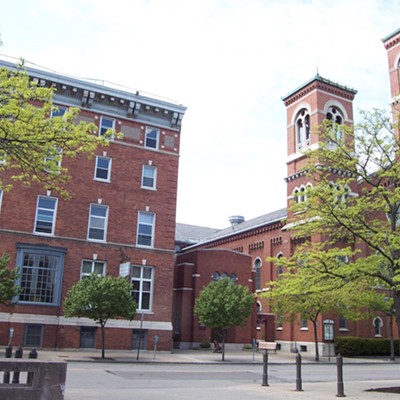Reader feedback 1.29.03
[
{
"name": "500x250 Ad",
"insertPoint": "5",
"component": "15667920",
"parentWrapperClass": "",
"requiredCountToDisplay": "1"
}
]
To the rescue?
I was shocked and disturbed by the trend described in Chris Busby's "To the Rescue" (January 15). Raised in urban St. Louis, and moving here from sprawling LA, I admit that Rochester is no metropolis, but no more is its downtown a so-called crime-filled ghetto.
As one of the "brave souls" who has congregated in the Park Ave/Art Gallery area, I live within minutes of downtown and never had problems enjoying its many (and comparably quite accessible and affordable) cultural/entertainment venues. That young suburban people are now visiting in boisterous packs would be uplifting were they forming substantive bonds with people actually living downtown, rather than sticking together, taking "baby steps," and taking off after a couple of beers.
Eileen G'Sell, University of Rochester
City-living perks
I can not be passive in regards to a few comments made by fellow Rochesterians in "Twenty-Somethings To The Rescue" (January 15).
First, in terms of retaining or attracting a younger population to the City of Rochester: We have one of the lowest costs of living in New York State. The house I own would cost almost four times as much in larger cities, yet the income is comparable.
In addition, Rochester has one of the most diverse and varied urban cultures outside of New York City. One does not have to look far to eat in a 5-star restaurant, surround oneself in turn-of-the-century architecture, and walk mansion-lined avenues (Park Avenue, East Avenue) and still be able to afford a home.
Secondly, I am disturbed by comments from fellow Rochesterians about the state of the City School District. As an educator in the district for almost 20 years, I am astounded by the talent and diversity of my fellow colleagues in the face of limited resources and funding.
I disagree with a quote in the article that "the city schools are no good." Sure, there are poorly run schools and ineffective teachers, but suburban and rural schools have their own problems. If I had children, I would want them to attend a city school, not a suburban school. Where else can one be surrounded by such a multicultural, diverse atmosphere?
Rochester is the most affluent and eclectic community outside of New York City, without the expensive cost of living. Let's spread the word!
Jeffrey Feinberg, Rochester (Feinberg is a lead teacher with the Rochester City School District)
Loving Rochester
After my boyfriend and I spent the day cross-country skiing in beautiful Mendon Ponds Park and visiting one of the several Starbucks in our community, we picked up a City Newspaper and read Chris Busby's article ("To the Rescue," January 15). We agreed with many of the points about Rochester; however, we disagreed with several also.
You said you have to "look hard" to find things to do in Rochester. City and Freetime are in several coffee houses, restaurants, and local businesses. Both list movies, concerts, lectures, art exhibits, restaurants, bars, and the like that interest 20-somethings and people of all ages.
We travel to New York City several times a year and have a harder time finding activities there that fit our budget and pique our interest than in Rochester. We have seen shows, art exhibits, and movies, attended lectures, and eaten at fabulous restaurants in Rochester at far less the cost and work than it would take there. In addition, we ski, snowshoe, and wine-taste without going an hour outside the city of Rochester.
You also mentioned that 20-somethings are not interested in buying homes in the city. There are beautiful properties in the city that are affordable, and buying is often cheaper than renting. We make less than $65,000 a year combined, and own two properties and rent one of them out --- so we know.
We disagree with your statement that "marketing toward the people that are already here and aren't likely to leave --- that is, families that are here or later-stage career people --- isn't where the emphasis should be put." We agree that we need to keep 20-somethings here, but we also need to market toward everyone, not just to these recent graduates if we want to have a diverse, complex community.
The article also mentioned that the "big three" employers are laying off. We must focus on the present; Wegmans, Paychex, and the colleges are all hiring on a continual basis. There are jobs in this community, unlike cities like Buffalo or New York City, where it is much more difficult to find employment. Perhaps we should focus on the companies that are actually making money than on those that are losing it.
We once discussed leaving Rochester, but decided that it was an exciting, fun, intellectual city to live in. Living here, getting to know the people, the history, and the opportunities convinced us. We want to work here, be entertained here, eat here, raise a family here, and experience culture here --- not just in our 20's, but for a long time to come.
Ben Ojala and Stacy Welch, Shelford Road, Rochester
Editor's note: For the record, the statements you cite were those of young adults quoted in the article, not those of City writer Chris Busby.
Palestinian points
Jack Spula's left-wing bias against Israel is getting tiresome. Regarding his comments in "Follow the Money" (December 31):
1) The Palestinians were offered a state alongside Israel and turned it down in 1948. Despite Israeli pleas that they stay, many left their homes to facilitate the Arab invasion. Now they claim a "right of return" after losing the war they provoked.
2) The Palestinians were again offered a state by Barak, and Arafat turned it down. Then the homicide bombers came along, forcing Israel to police the West Bank and Gaza.
3) Arab leaders such as Arafat deliberately promote unrealistic expectations among their followers to keep the conflict going, along with the fantasy that Israel will be destroyed and the Palestinians will rule the entire area. The other Arab countries can continue using the conflict to incite hatred against Israel and deflect criticism from their own deplorable regimes.
4) By hiding among their own civilian population, a clear violation of international law, Palestinian combatants promote civilian casualties deliberately to inflame public opinion against Israel.
5) The Palestinians danced in the streets on 9/11/01.
6) In a recent book, "The West and the Rest," the author cautions against expecting Palestinians to develop a democracy and reject radical Islam. He also rejects the view that America is being attacked by terrorists because of our support of Israel. "On the contrary," Roger Scruton writes, "it is Israel's relation to America that makes Israel the target of militant Islam." The "corrupting" values of the West are represented by the Israelis in the Middle East, where radical Islamists want to establish Islam as the only source of the law and the only religion.
7) The Israeli Palestinian conflict is only one of the 30 or so wars worldwide caused by Muslims as aggressors.
8) It is difficult to avoid the opinion that Islam itself, with the obvious exception of the Sufis, has degenerated somehow into a source of inspiration for terrorism. It is the only major world religion that has a large percentage of adherents who believe in murdering civilians and which allows its clergy to issue death threats against people they disagree with. I guess this helps illustrate the disparity between religion and genuine spirituality.
Alan Glaser, East Main Street, Rochester
Obstacles to peace
In his December 31 tirade ("Follow the Money"), Jack Bradigan Spula blames Israel (as usual whenever he refers to the Middle East) for the cancellation of Christmas events in Bethlehem. Yet Israel did not cancel Christmas celebrations there; rather the Palestinian Authority did so to protest the fact that Arafat, who isn't even a Christian, was not allowed to attend the festivities.
If Christmas events in Bethlehem would have been held with Arafat in attendance, it seems to me that there was no reason, other than to find something else to blame Israel for, to cancel those events.
It would have been wonderful if Christmas celebrations in Bethlehem had taken place. It would also be wonderful if Jews could pray unmolested at the Cave of the Patriarchs in Hebron (Judaism's second holiest site) or their other holy sites in the West Bank, such as the Tomb of Rachel just outside Bethlehem or the Tomb of Joseph in Nablus, which was destroyed by the Palestinians two years ago and subsequently converted into a mosque.
By the way, the rabbi who ran the yeshiva (seminary) at the Tomb of Joseph was also murdered by the Palestinians as he returned unarmed to try to rescue the holy Torah scrolls from the tomb when it was being ransacked.
Let's be frank. Mr. Spula cares nothing about Jewish rights and would be happy to see the West Bank be Judenrein. Under such a situation, Jews would be able to live and pray in Paris, Cairo, Tokyo, or Rochester, but not at or near their holy sites in the West Bank. Mr. Spula would also have Yasser Arafat (the same Yasser Arafat who says that the Jews never had a presence in Jerusalem in ancient or pre-modern times and had to be lectured to by Bill Clinton about the absurdity of this position) be the guardian of Judaism's holiest place, the Temple Mount in Jerusalem.
Arafat's gamble that violence would get him more than negotiation has failed. Yet polls show that up to 65 percent of Palestinians continue to support suicide bombings and other violence against Israeli civilians and seek the total destruction of Israel (http://www.jmcc.org/publicpoll/results/2002/no47.htm). Thus, it is clear that peace is nowhere on the horizon.
The only way to reach a peace settlement in the Middle East is for the violence to stop, for each side to recognize that they will not get everything that they want, for both sides to teach tolerance and acceptance of the other, followed by negotiations to reach a final, mutually-accepted treaty which ends the conflict once and for all. Unfortunately, a great deal of work needs to be done before the possibility of peace will arise again.
Stanley Schaffer, Runnymede Road, Rochester
Jack Bradigan Spula responds: Glaser and Schaffer raise too many historical issues to answer here. Readers should examine the work of the "new historians," like Avi Shlaim's The Iron Wall. But the main thing is to condemn all violence and propound the "two-state solution" as the basis of a just peace. This means, for starters, an Israeli withdrawal from the illegally occupied West Bank and Gaza.
Yes, the story of Joseph's Tomb is awful, the kind of thing that flows from religious zealotry mixed with politics. But there's history at work here, too. Observers like Israeli journalist Gideon Levy note that Israel systematically violated non-Jewish religious sites during the 1948 war, and since 1967 as well. Palestinians have seen their mosques and cemeteries destroyed, and they've been denied access to their holy sites through (illegal) closures and other restrictions.
It should be obvious that good and bad are found on both sides. Reports from occupied Palestine after 9/11 indicate that most ordinary Palestinians mourned along with us that day. One news story told of hundreds of Palestinians holding a candlelight vigil in East Jerusalem. A friend of mine who's been working with the Christian Peacemaker Team in Hebron heard many heartfelt expressions of sympathy from Palestinians there.
The important events this past Christmas in Bethlehem didn't involve any high official appearance; they were about the lives of ordinary people under harsh military rule. The sources I quoted were worried about raw hunger, even famine --- not protocol.
Peace and violence
On January 18, I stood shoulder to shoulder with half a million people in our nation's capital proclaiming our rejection of war as a way of achieving lasting peace. It was an encouraging and inspiring experience. Everyone I could see, as I made my way through the churning mass of marchers, chanters, singers, and dancers, appeared to be well fed and the product of a loving, caring environment.
Twenty-four hours later, I was sitting in a theater watching Martin Scorsese's Gangs of New York, a fictionalized account of events that took place in the slums of 19th-century New York. Immigrants from Ireland fled starvation at home only to encounter angry, armed mobs of Americans with no jobs and no hope, who saw them only as competition.
The violence and brutality were a startling and horrible contrast to the hopeful multitude in Washington who, on January 18, had demonstrated what is best in our species. This was a multitude that, by other circumstances, could easily have been a crazed mob bent on destruction.
When we think we can safely deny the means of a dignified life to impoverished people, turning the greater portion of our wealth to preparation for war, we are rolling back the thin veneer of civilization that keeps our society intact.
Think about it.
John Kastner, Ericsson Street, Rochester
Questions for Bush
President Bush should remember that he was essentially elected by five Supreme Court justices, not by the majority of US citizens. That is the truth, and no amount of war-making will make it go away.
A majority of us likely don't support the arm-twisting that Bush is using to push his war on Iraq. Some of us remember how much money Haliburton (and that guy who was running it at the time) made off the first war in Iraq. Some of us are aware of how many Iraqi civilians died in that war and how many likely will be killed in the next one. Some of us are wondering why the president is so unwilling to let the UN serve its function.
Here are some questions I'd love to hear the president answer:
• Why is he focusing on warring with Iraq when it will increase the likelihood of terrorism against our country? Isn't that at odds with the War on Terrorism?
• Why is he willing to spend so much of the taxpayers' money to fund the destruction of Iraq when that money could be better used to improve our own country and its economy?
• Why are he and his administration continuing down this path of unilateralism and "US exceptionalism" when it is turning us into the kind of rogue nation that Bush purported to stand against in his infamous Axis of Evil speech?
I wonder.
Michael L. Bohn, Rochester
Writing to City
We welcome and encourage readers' letters for publication. Send them to: [email protected] or The Mail, City Newspaper, 250 North Goodman Street, Rochester 14607.
Our guidelines: We don't publish anonymous letters --- and we ask that you include your street name and city/town/village. While we don't restrict length, letters of under 350 words have a greater chance of being published. We do edit letters for clarity and brevity. And in general we don't publish letters (or longer "op-ed" pieces) from the same writer more often than once every three months.








